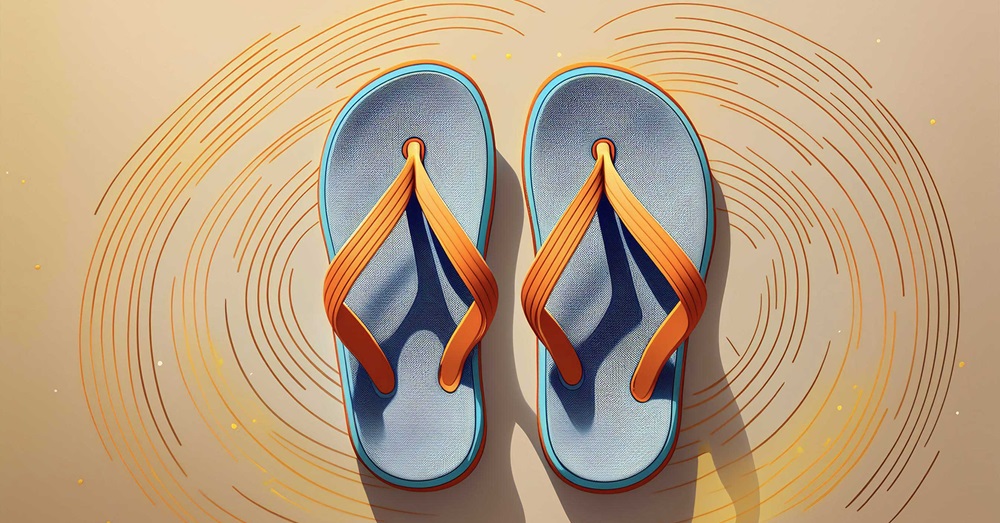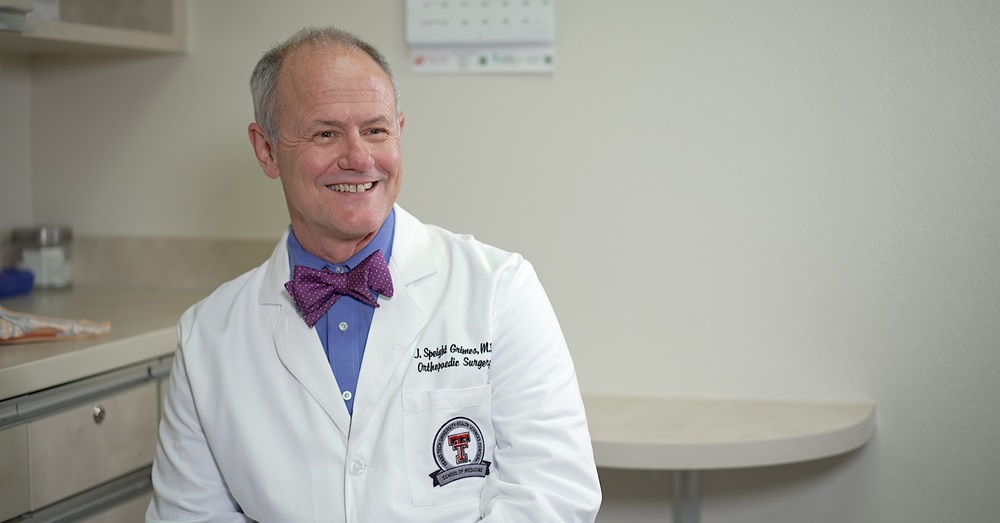Feet First: Prioritizing Foot Health in Summer Footwear Choices
Texas Tech Physicians Foot and Ankle Surgeon Says Avoid Pain and Injuries

As the summer sun beckons people toward more outdoor activities, it’s crucial to remember that a person’s choice of seasonal footwear can significantly impact their foot health. Jerry Grimes, M.D., a foot and ankle surgeon at Texas Tech Physicians, shared insights on selecting summer footwear to avoid pain and injury.
“The allure of flip-flops lies in their casual comfort and breathability. Walking in them exercises muscles in the feet, ankles and lower legs, which are used to being supported and cushioned with structured shoes,” Grimes said. “The human being was designed to walk barefoot. That naturally stretches us out.”
While flip-flops protect a person from barefoot hazards like hot surfaces and bacteria, Grimes advised that flip-flops are best worn for short durations because they can lead to cramps and discomfort, especially if the Achilles tendon is tight. He said transitioning from supportive footwear to flat, unstructured options like flip-flops requires caution to prevent stress fractures and muscle strain.
When choosing whether to wear flip-flops, it’s also important for the individual to consider the environment they will be in.

Jerry Grimes, M.D.
“For people who have normal sensations and strength in their ankles, wearing them, say, around a pool, walking in the mall or something like that should be fine,” Grimes said. “The really thin ones have very little cushion, so you’re going to feel the structure, the ground underneath you.”
For many people, summer is also synonymous with sandals. Grimes said a comfortable, secure fit and stability are vital in avoiding pain and injury. Features to look for include appropriate length and width, a tread which provides traction, adjustable straps and a supportive insole and footbed.
When it comes to arch support in sandals or other shoes, Grimes said there is no one-size-fits-all advice. “A young, healthy person often needs no support in their foot, even if they have flat feet. If it isn’t painful, it’s not considered a problem.”
While inserts are one early-stage treatment to alleviate pain from flat footedness, he strongly advised seeking medical guidance on the right type for the individual.
“One place people do go wrong is they think they can just buy a tall arch to try to support the arch that’s already fallen,” Grimes said. “And that’s never going to work because the arch wasn’t ever meant to be pushed on.”
Though more relaxed and comfortable for summertime, flip-flops and open-toed sandals offer little protection from the risk of injuries.
“We don’t want to use them around anything dangerous: lawnmowers, weed eaters, animals, those types of things,” Grimes said. “If anyone’s worn flip-flops for any length of time, you know that stone always seems to find its way between your shoe and your foot. That could be anything sharp or pointy, and you could end up with a wound. So, we want to be careful.”
For individuals with diabetes, going barefoot or wearing flip-flops or sandals are never good choices, Grimes stressed.
“I’ve had people come in with needles they didn’t even know they stepped on,” Grimes said. “But even if they don’t have neuropathy and a lack of sensation in their feet, diabetics don’t heal like everybody else. And so, if they get a wound, the risk of infection and wound problems is much more magnified.”
Beyond footwear, Grimes emphasized the importance of protecting a person’s feet from skin cancer. Flip-flops and sandals expose the feet to the sun, so wearing sunscreen is a must. Grimes said every year, someone is referred to him with a melanoma on their foot.
“Unfortunately, that is the most dangerous place that you can get a melanoma,” he said. “We don’t know why, whether it’s that we just don’t notice them or whether they’re more aggressive, but when someone has a melanoma on their foot, it’s a very serious problem. If they get very large, it’s very hard to be able to excise them and still save the foot.”
Grimes said by making informed footwear choices and prioritizing foot health, individuals can step into summertime with confidence and comfort.
Related Stories
The John Wayne Cancer Foundation Surgical Oncology Fellowship Program at Texas Tech University Health Sciences Center Announced
TTUHSC is collaborating with the John Wayne Cancer Foundation and has established the Big Cure Endowment, which supports the university’s efforts to reduce cancer incidence and increase survivability of people in rural and underserved areas.
Making Mental Health a Priority in the New Year
Sarah Mallard Wakefield, M.D., a psychiatrist with Texas Tech Physicians, talks about strategies to combat widespread and growing anxiety.
TTUHSC Dean to be Inducted into the National Academies of Practice as Distinguished Fellow
Gerard E. Carrino, Ph.D., MPH, dean of the TTUHSC Julia Jones Matthews School of Population and Public Health, will be inducted into the National Academies of Practice (NAP) as a Distinguished Fellow of the Public Health Academy.
Recent Stories
National Academy of Inventors Names TTUHSC Faculty Senior Members
The National Academy of Inventors (NAI) has designated two current and one former TTUHSC faculty researchers as Senior Members.
The John Wayne Cancer Foundation Surgical Oncology Fellowship Program at Texas Tech University Health Sciences Center Announced
TTUHSC is collaborating with the John Wayne Cancer Foundation and has established the Big Cure Endowment, which supports the university’s efforts to reduce cancer incidence and increase survivability of people in rural and underserved areas.
TTUHSC Receives $1 Million Gift from Amarillo National Bank to Expand and Enhance Pediatric Care in the Panhandle
TTUHSC School of Medicine leaders accepted a $1 million philanthropic gift from Amarillo National Bank on Tuesday (Feb. 10), marking a transformational investment in pediatric care for the Texas Panhandle.
